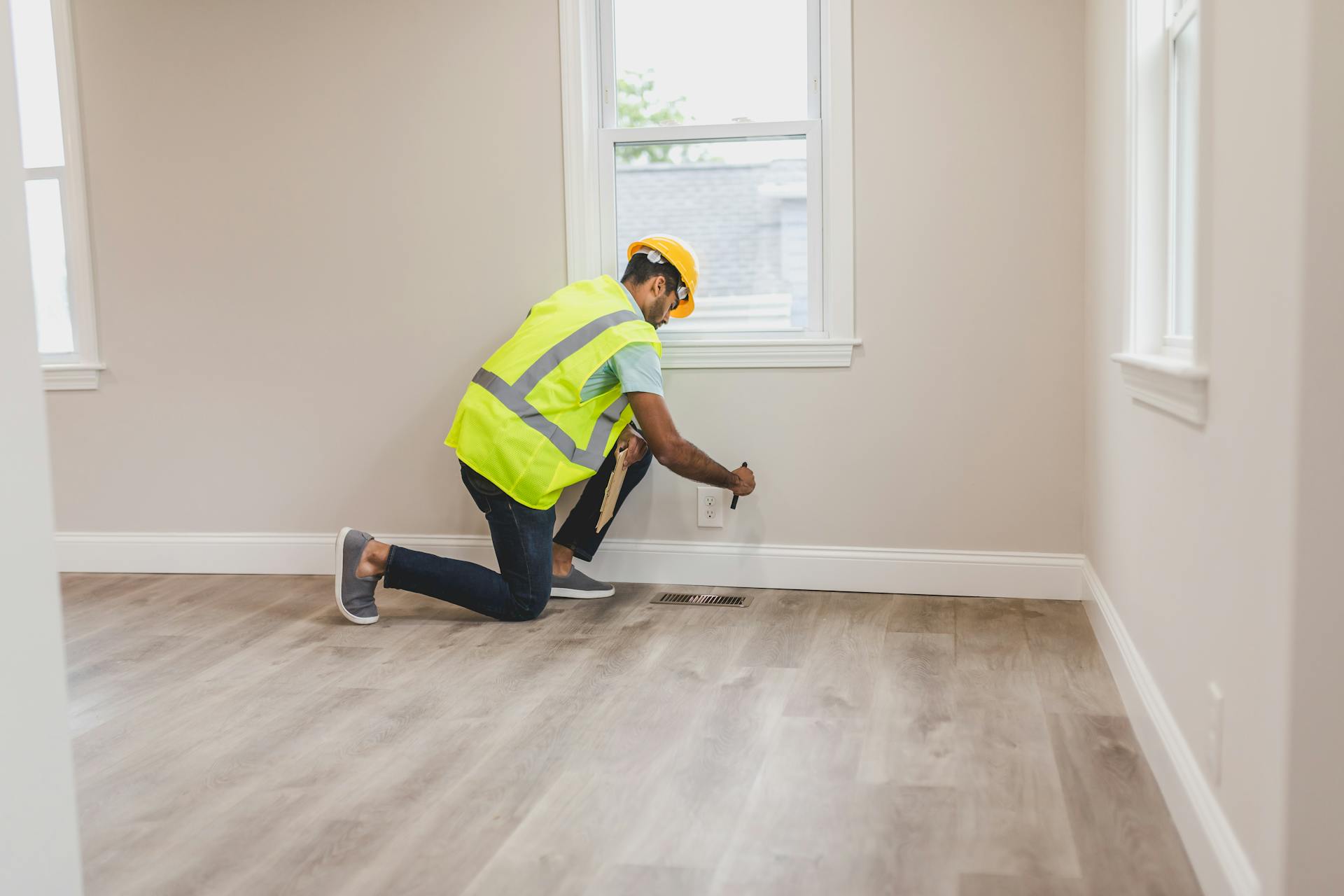
A home appraisal for refinance can be a stressful experience, especially if it doesn't go in your favor. This is often due to common issues that can hurt the appraisal value of your property.
Disregarding property condition is not an option, as it can lead to a lower appraisal value. For instance, if your home has outdated electrical systems, it may not meet current safety standards, which can significantly decrease its value.
Poorly maintained or damaged exterior features can also hurt your home's appraisal value. A cracked driveway or broken gutters can give the impression that you haven't taken care of your property, which can negatively impact the appraisal.
Inadequate or outdated interior features can also be a major issue. For example, if your home's plumbing is outdated, it may not meet current safety standards, which can lower its value.
A unique perspective: Reasons Not to Refinance Your Home
Factors That Can Bring Value Down
A low appraisal can be a major setback for refinance, but understanding what can bring value down can help you prepare. Declining market in the neighborhood can result in low appraised values, making it harder to get a loan.
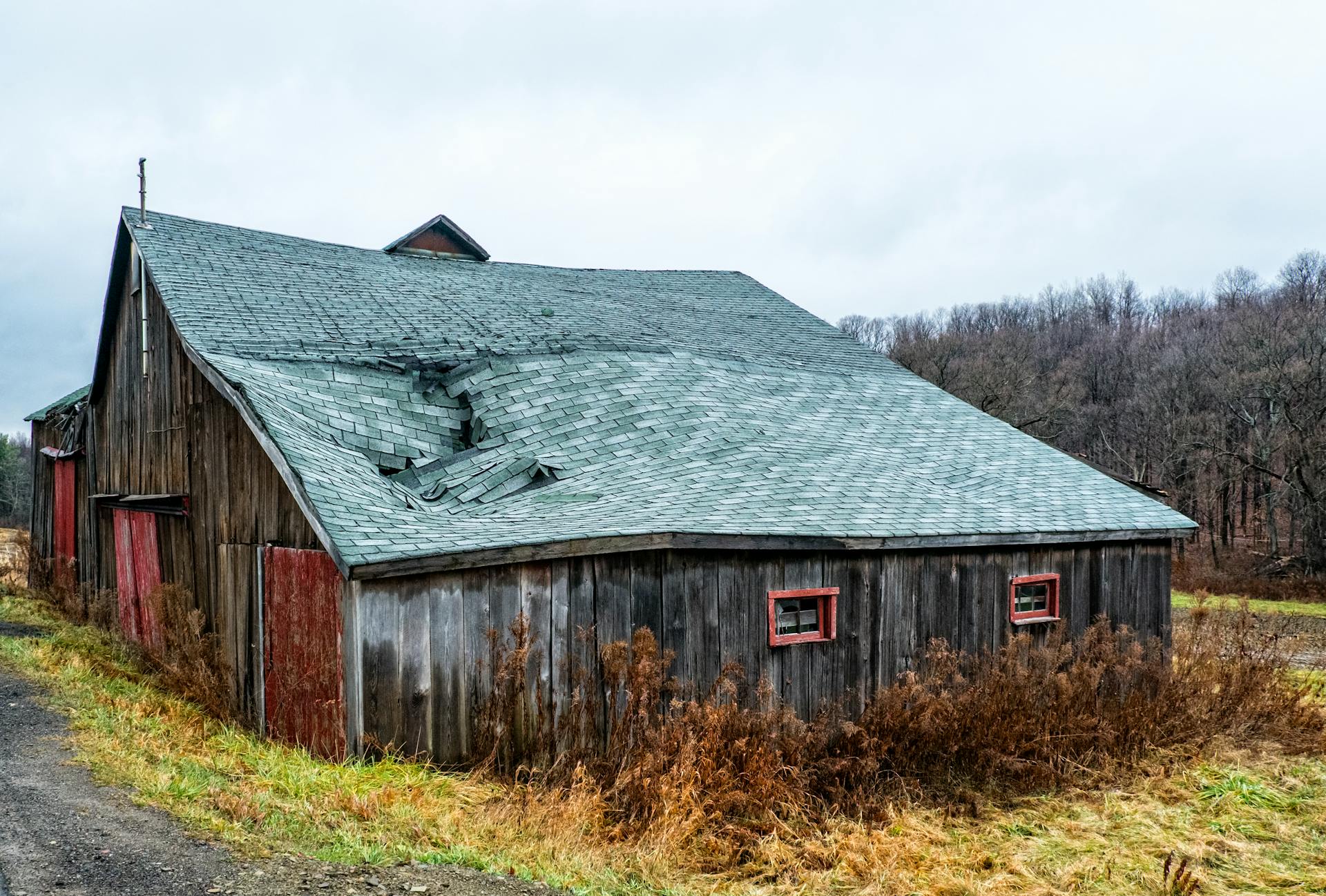
A slow real estate market can also hurt your appraisal, especially if property values are declining and houses are taking more than six months to sell. This can indicate a weak demand for homes in your area.
The condition of the property itself can also bring value down, including needed repairs, deterioration, renovations, and remodeling. The appraiser will take all these factors into account when determining the value of your home.
Sale Price Exceeds Appraised Value
If the sale price of a home exceeds the appraised value, it can be a major issue for the buyer and the lender. The lender will order an independent appraisal to find the home's value, and if the appraiser's valuation comes in lower than the agreed-upon sales price, the loan can't move forward as is.
The seller would have to drop the sales price to the appraised value, or the buyer could make up the difference by making a larger-than-required down payment. This can be a risk, as the buyer may be paying more for the home than it's worth.
You might enjoy: What Is Appraised Value
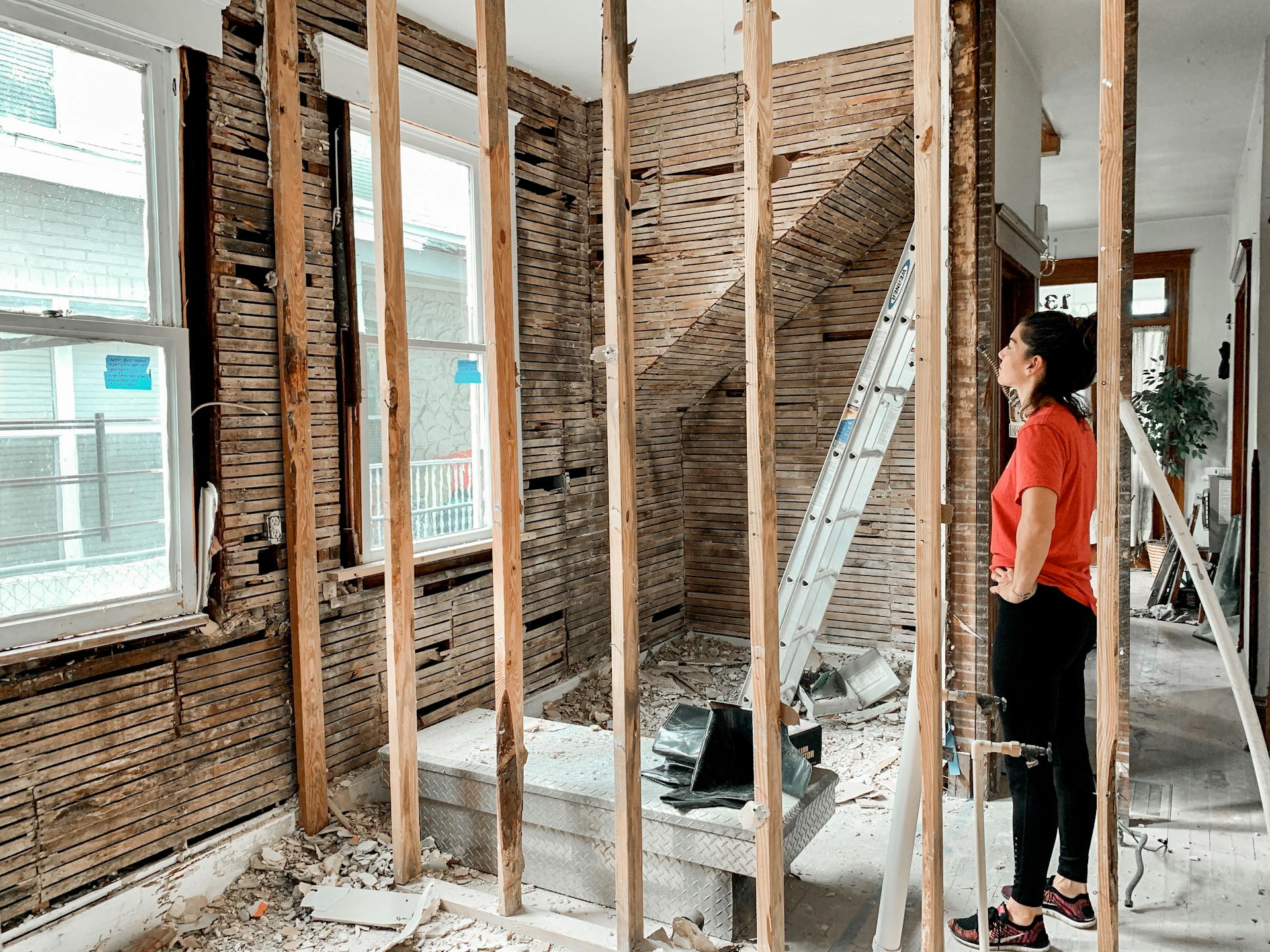
The buyer may even be entering home ownership with negative home equity. It's also possible to dispute an appraisal by asking for a reconsideration of value, but there's no guarantee the dispute will succeed.
Your Realtor can help with disputing the appraisal, but it's essential to be aware of market conditions in your area and know if your home has any common issues that can hurt the appraisal.
Neighborhood Market Decline
A neighborhood market decline can significantly impact your home's value. If property values have been declining over the previous 12 months, lenders may ask for a larger down payment, which can be a challenge for borrowers.
The local housing market and home location are outside of your control, but they still play a critical role in determining your home's appraised value. Factors such as the neighborhood's quality, nearby schools, and area crime rate can all affect your home's value.
If the local real estate market is weak, with an oversupply of homes and houses taking more than six months to sell, it can indicate lower property values. A high volume of distressed properties in your area can also suppress price growth.
Rising interest rates have contributed to a rebalancing of the market, giving buyers more leverage than they had when conditions favored sellers. This shift in the market can result in lower property values, which can be reflected in the appraisal report.
What Negatively Affects a?
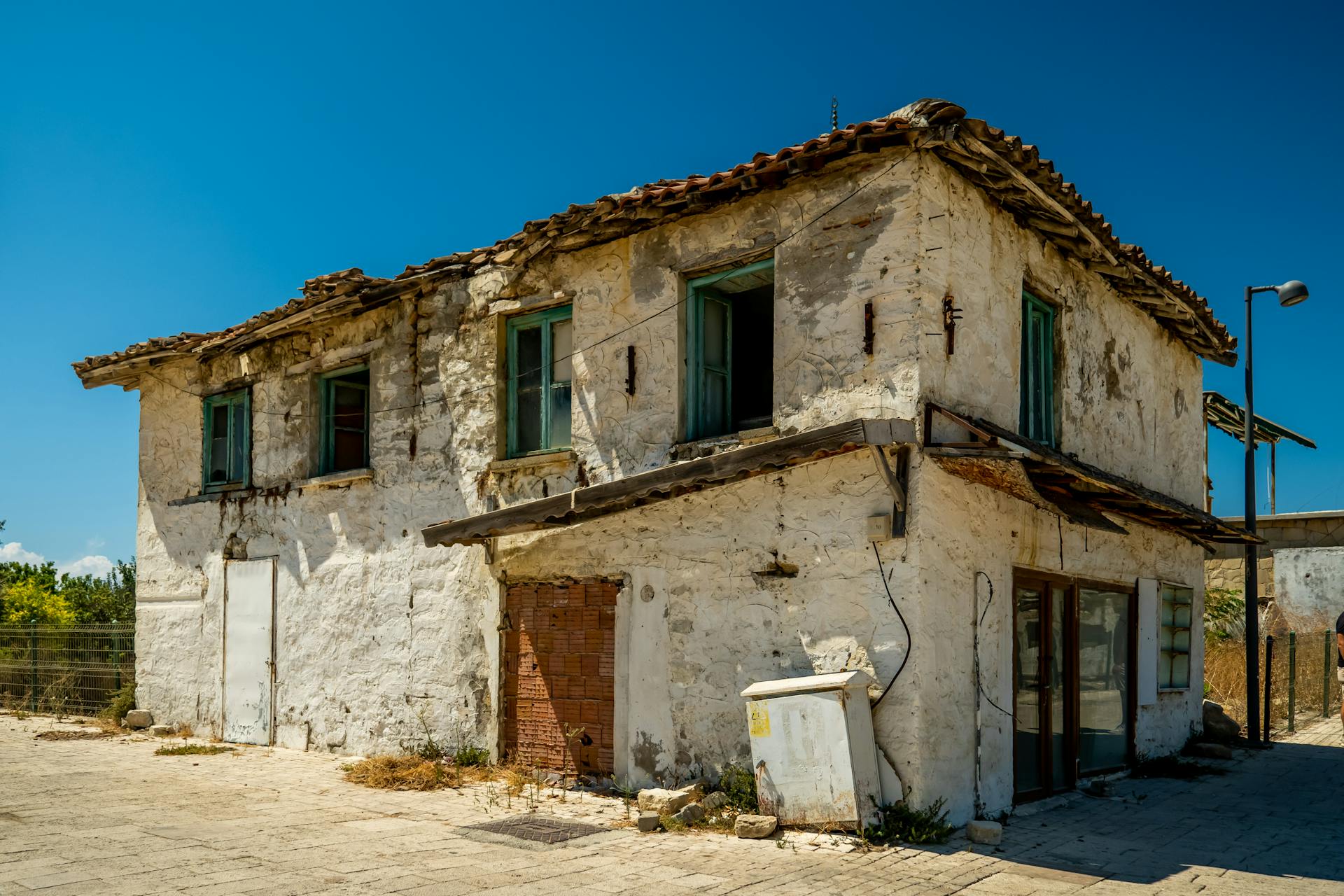
Here are some common issues that can negatively affect a home appraisal. A home's location can be a major factor, with homes in desirable areas typically appraising for more than those in less desirable locations.
Land size can also be a consideration, with larger lots often commanding higher prices. However, this isn't always the case, as the size of the lot can also impact the overall value of the property.
The number of bedrooms and bathrooms can also impact the value of a home, with more bedrooms and bathrooms typically increasing the value. Square footage is another important factor, with larger homes often appraising for more.
The year built can also impact the value of a home, with newer homes typically appraising for more than older ones. Curb appeal is also a consideration, with homes that are well-maintained and have a nice exterior often appraising for more.
Here are some specific factors that can negatively affect a home appraisal:
- The condition of the major systems and home appliances
- The condition of the home and its systems
These factors can all impact the value of a home, so it's essential to be aware of them before an appraisal.
Factors That Can Bring Value Down
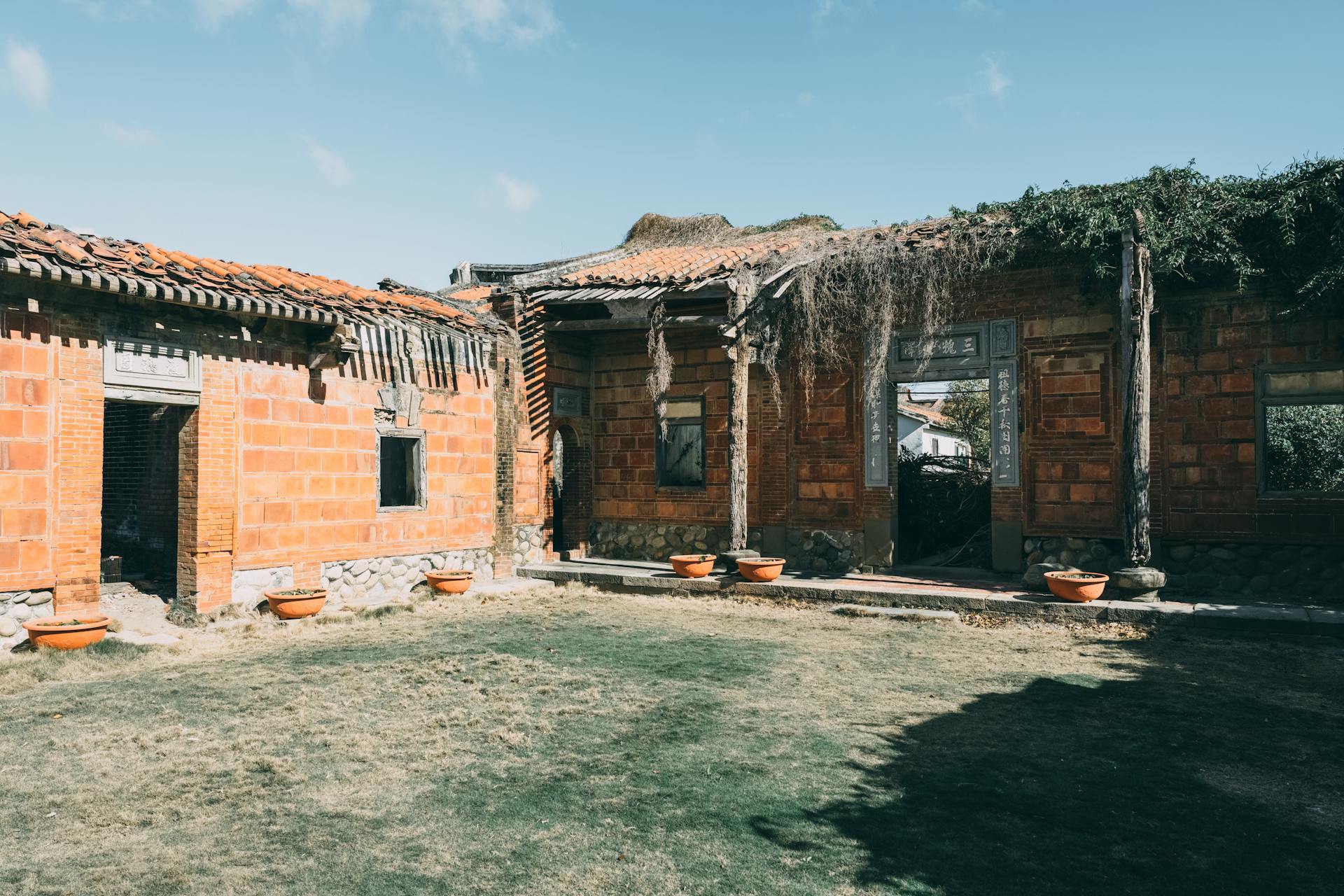
A low appraisal can be a major setback for homebuyers and sellers alike.
Appraised value is often lower than the sale price due to an independent appraisal ordered by the lender.
Declining market in the neighborhood can also bring down the value, as the appraiser assesses the real estate market and selects one of three choices: increasing, stable, or declining.
A slow real estate market can also contribute to lower property values, especially if property values are declining, there's an oversupply of homes, and houses are taking more than six months to sell.
High volume of distressed properties in your area can suppress price growth and ongoing downtrends in the market can require an appraiser to adjust for comparable transactions.
Needed repairs, deterioration, renovations, and remodeling can also negatively affect a home appraisal.
Property Condition Issues
Property condition issues can be a major concern for home appraisals. Deferred maintenance on critical repairs is a significant issue, with lenders declining mortgages if there's evidence of major issues like roof repairs, broken window panes, leaking water lines, or outdated HVAC systems.
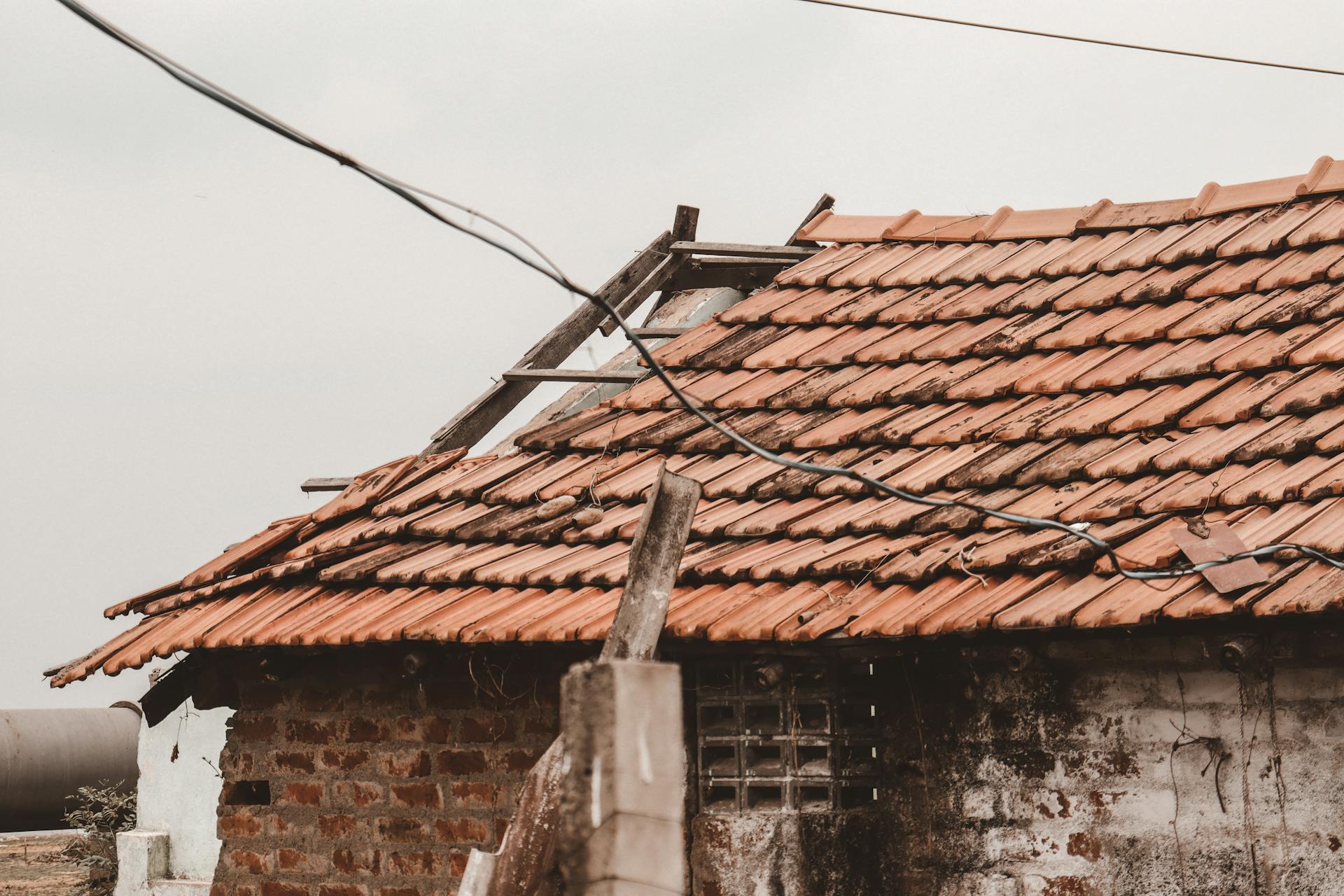
Other concerns include habitability issues, such as structural problems like cracks in the foundation, which can indicate unstable settling of the property. Cracks in the foundation can be costly to repair, with average costs ranging from $4,000 to $10,000, and major repairs can even reach $100,000.
Pest infestations, like mice droppings or termite damage, can also be a major issue, affecting the home's value and even the safety of its occupants. Roof damage, such as missing shingles or leaks, can also significantly impact the home's value.
Common building materials that may contain asbestos include insulation, floor and ceiling tiles, siding, roof shingles, and flooring glue. Outdated systems, appliances, and interiors can also negatively impact the home's value.
Worth a look: Home Damage Claims
Signs of Neglect
Signs of neglect can significantly impact the value of your property. Deferred maintenance on critical repairs, such as roof repairs, can lead to a declined mortgage loan.
A cracked foundation can dramatically fall the home's value, often prompting an engineer's report to determine whether the foundation is in proper shape. The average cost of foundation repairs can be as high as $10,000, and in some cases, replacement can cost up to $100,000.

Excessive clutter or signs of neglect can jeopardize the home's habitability, making it ineligible for a mortgage loan. A severely cluttered home may prevent an appraiser from accessing certain parts of the home, affecting the appraisal.
Peeling paint, mold, and outdated HVAC systems can also signal neglect. The biggest health risk posed by asbestos is during remodels or renovations when the asbestos-laden building materials can get damaged and cause the fibers to become airborne.
Here are some common signs of neglect that can impact your property's value:
- Broken window panes
- Leaking water lines
- Missing handrails
- Outdated HVAC systems
- Noticeable electrical problems
- Peeling paint
- Mold
These signs of neglect can lead to costly repairs and negatively impact your property's value. By addressing these issues, you can ensure a smooth home selling process and a fair market value for your property.
Pest Damage
Minor pest issues like anthills in the yard may not raise concerns, but major problems like termite damage can significantly lower your appraised value.
Termite damage can be permanent and jeopardize the home's structural integrity, making it hard to address once discovered.
Mice droppings in the basement or hollowed or damaged wood from termites are major issues to address before an appraiser comes through your home.
You definitely don't want the appraiser to check "yes" in the box recording whether there's evidence of an infestation.
Affects
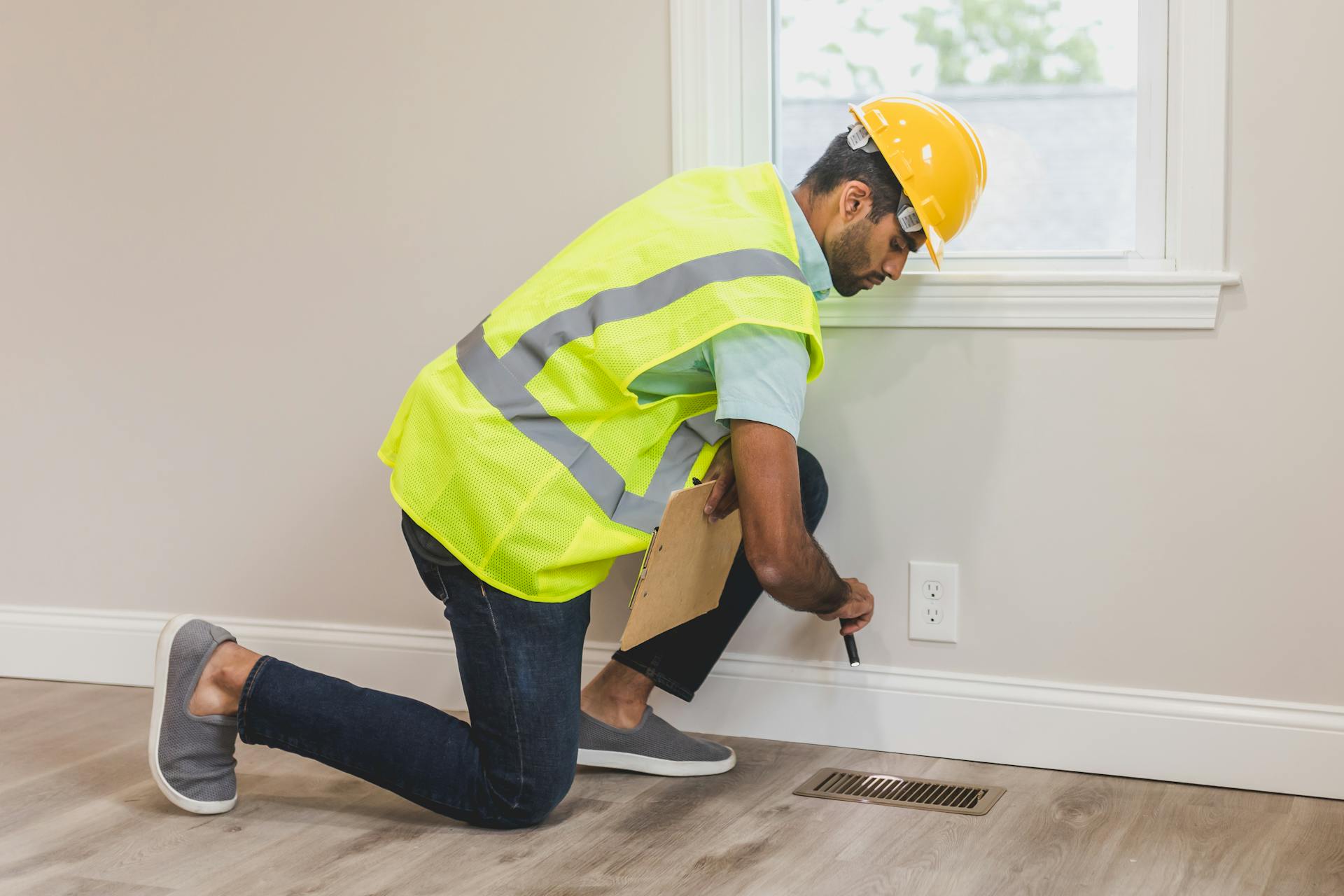
A home's condition can have a significant impact on its appraisal value. The appraiser will consider various aspects of your home, including its location, land size, and the year it was built.
The number of bedrooms and bathrooms can also affect the appraisal. A home with more bedrooms and bathrooms may be worth more than a similar home with fewer.
The square footage of your home is another important factor. A bigger home may be worth more than a smaller one, assuming all other factors are equal.
Curb appeal is also crucial. If your home's exterior looks uninviting or neglected, it may hurt its appraisal value.
Major systems and home appliances, such as the HVAC and plumbing, should be in good working condition. If they're not, it could negatively impact the appraisal.
Here are some factors that can affect a home's appraisal value:
- The home's location
- Land size
- Number of bedrooms and bathrooms
- Square footage
- The year built
- Curb appeal
- Major systems and home appliances
- The condition of the home and its systems
Drainage Issues
Lack of proper drainage can be a major concern for homeowners and buyers alike.
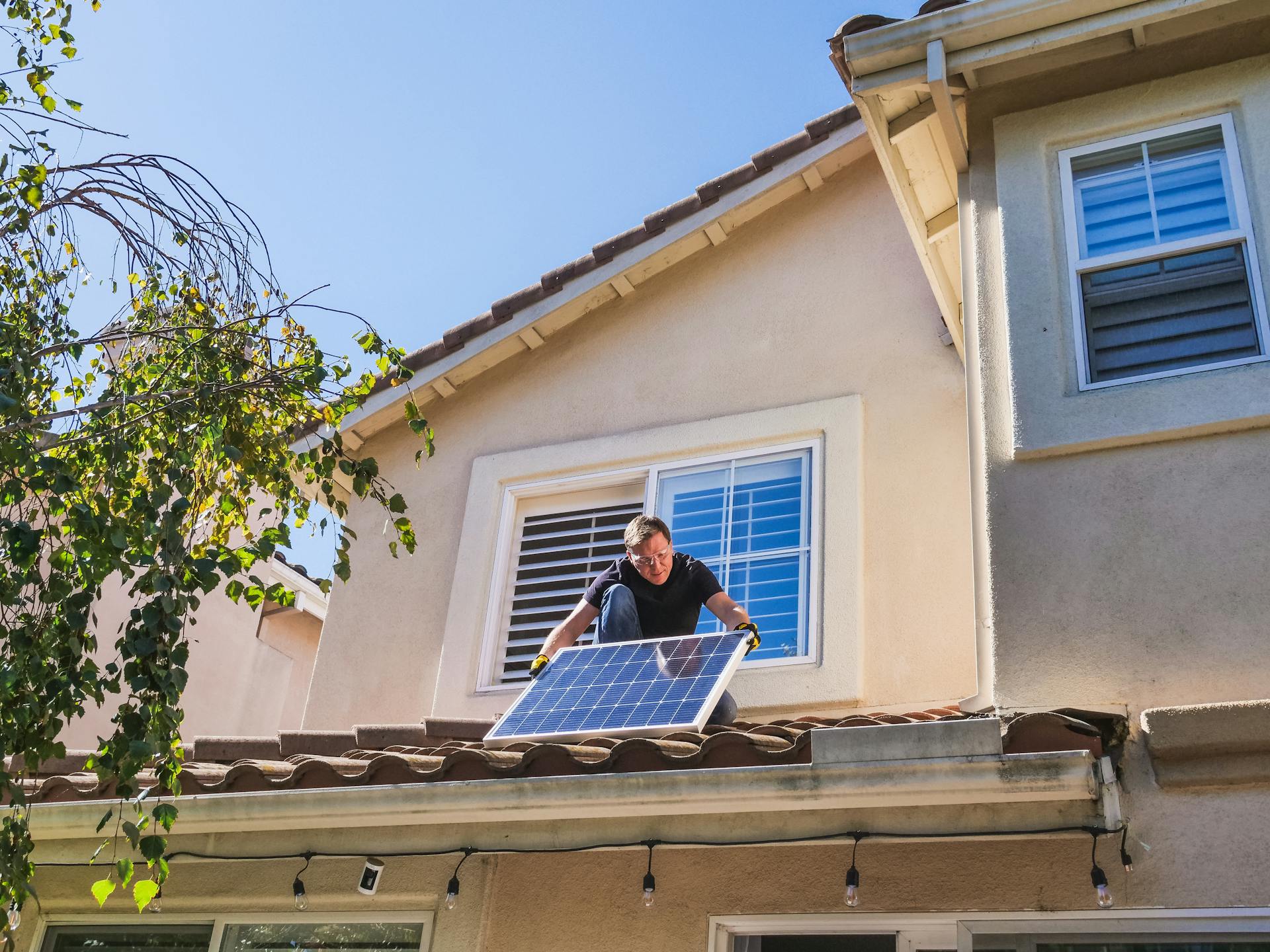
An appraiser will evaluate your home's drainage system by looking for signs of erosion or standing water.
Erosion or standing water can indicate poor drainage, which can lead to severe problems like foundation cracks and basement flooding.
They'll also check the functionality of gutters, downspouts, and grading around the property to ensure water is directed away from the house.
Poor drainage can suggest potential future expenses and maintenance problems, which negatively impact the appraised value.
Property Characteristics
A dated interior can be a major turnoff for potential buyers, and it's not just about aesthetics. An appraiser will note the condition of your home's interior, particularly the kitchen and bathrooms, and it can decrease your home's value if they need remodeling in the near future.
High-end kitchen appliances and quartz countertops can be a plus, but undesirable finishes like green quartz or white appliances can be a drawback. Buyers may be willing to replace them, even if they're high-quality, because they don't fit their desired style.
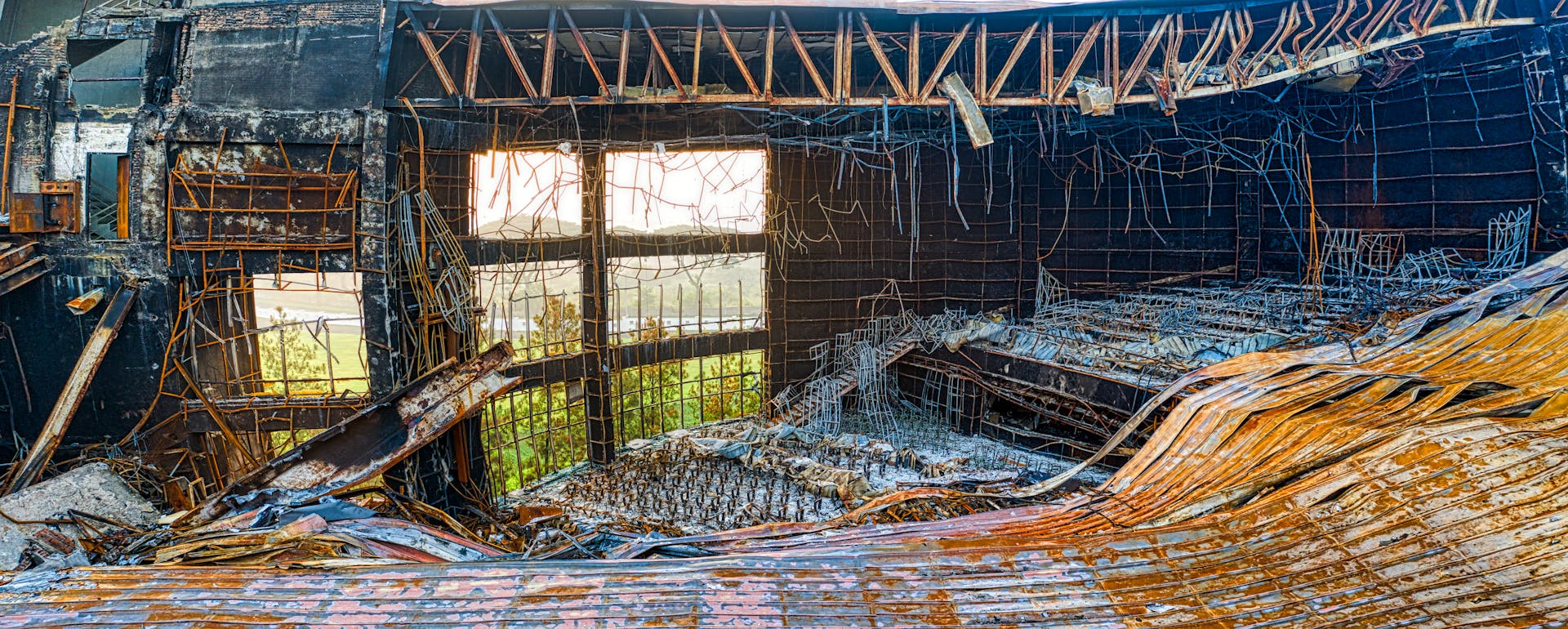
A home with fewer bedrooms and bathrooms can also lower your appraised value, as it may mean a buyer will want to reconfigure the property in the future. This is especially true if the home has ample square footage but doesn't meet the typical number of bedrooms and bathrooms for the area.
Local Market
A declining market in the neighborhood can lead to a lower appraised value, with lenders asking for more money down if the property is in a neighborhood with declining values over the previous 12 months.
Factors such as the local housing market and the home's location are outside of your control, but they play a critical role in determining your home's appraised value.
The state of the local real estate market can vary greatly, with two identical homes having vastly different values if they're not in the same market.
A slow real estate market can also contribute to lower property values, with an oversupply of homes and houses taking more than six months to sell indicating weak demand.
A unique perspective: Do Modular Homes Depreciate
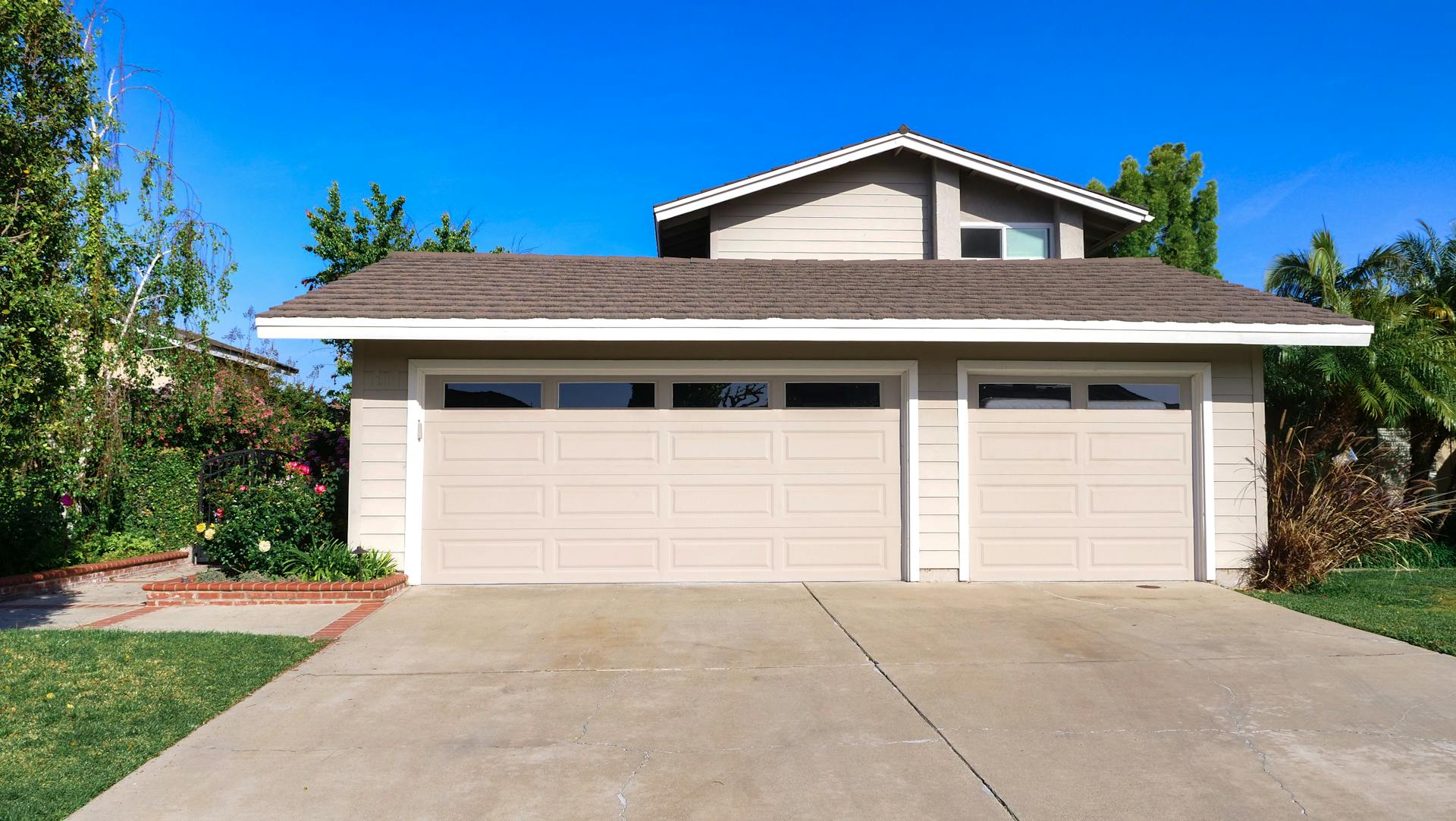
A high volume of distressed properties in your area can suppress price growth, and ongoing downtrends in the market can require an appraiser to adjust accordingly for comparable transactions.
Homes located in areas with high levels of crime or low-rated schools will likely be valued lower by comparison, with nearby eyesores or high noise levels also lowering your home's appraised value.
A high volume of short-term rentals, especially if poorly managed, can affect your appraisal, with a 10% to 24% decrease in value possible, depending on the location and health risks.
Outdated Systems and Interiors
Outdated systems and interiors can significantly impact the value of your property.
Outdated appliances or major systems like plumbing, electrical, or HVAC can be costly to update. If yours are outdated, it could affect the value of the home. If the interior hasn't been changed for decades, it may not appeal to buyers, causing the value to decrease.

Outdated features can also signal that the home has not been taken care of properly and that it has more issues than meets the eye. For instance, an outdated HVAC system can lead to uncomfortable spaces and poor indoor air quality.
An outdated HVAC system can be inefficient, leading to higher energy costs and inconsistent temperature regulation throughout the home. Appraisers view HVAC systems as critical components that contribute to the home's overall functionality.
Here are some common outdated features to watch out for:
- Outdated appliances (e.g. white appliances instead of stainless steel)
- Green quartz or other undesirable finishes
- Older plumbing and electrical systems
- Noisy or inefficient HVAC systems
These features can make a home less appealing to buyers and decrease its value. However, if you have a well-maintained 1970s home, it can still sell well if it has been kept up to date with modern touches.
Unique Property
Unique properties can be a challenge for appraisers due to a lack of comparable homes. This can be especially true for rare properties like geodesic domes, log cabins, or barndominiums.
In rural areas, the lower inventory of available properties can make it hard to find numerous recently sold homes. This can lead to undervalued estimates.
Appraisers may look for real estate comps in nearby competitive neighborhoods to find similar properties. However, this can increase the risk of a house being undervalued.
If you're buying an unusual type of property, it's a good idea to talk to your loan officer about the appraisal process before applying for your loan. They may be able to find a licensed appraiser who has experience with unusual structures.
Fewer Beds
Having fewer bedrooms than the typical number for the area can lower your appraised value, as it might mean a potential buyer will want to reconfigure the property in the future.
A home with fewer bedrooms and bathrooms usually has less square footage, which is a major factor appraisers consider in their calculations.
Less square footage can negatively impact your appraised value.
Poor Layout
A poor layout can be a concern when it comes to the value of your property.
Depending on the age of your home, the floor plan may be more compartmentalized than the open layouts found in modern builds.
A closed-off kitchen or bedrooms that hang right off the dining area can be seen as "atypical or functionally obsolete" by an appraiser.
However, a top-selling real estate agent in Las Vegas notes that if a buyer is willing to purchase the house at a certain price, the appraiser may not reduce the value due to the layout.
An appraiser is more likely to reduce the value for an unusual layout when someone refinances a home.
Curious to learn more? Check out: Does Getting Braces off Hurt?
Low
A low appraisal can be a major setback in a home sale or refinance. It can even derail the entire transaction if not addressed.
A low appraisal occurs when the home's value is determined to be lower than the sales price or the amount borrowed against it. This can happen for various reasons, such as outdated property values or incorrect comparisons.
For home buyers, a low appraisal can be a significant problem. If the appraisal comes in lower than the sales price, the buyer won't be able to borrow enough money to cover the price of the home. They'll either have to pay the difference out of pocket or renegotiate with the seller to drop the sales price.
A low appraisal can also impact homeowners who want to refinance their mortgage. If the appraisal is low, the homeowner may not have enough equity to borrow against, making refinancing more difficult or even impossible.
In one scenario, a homeowner wanted to borrow $100,000 through a home equity loan and currently owed $200,000 on their mortgage. If the appraised value was $325,000, the loan-to-value ratio would be 92%, too high to meet the lender's requirement. This highlights the importance of a fair and accurate appraisal in determining borrowing limits.
Consider reading: Home Equity Loans
Lack of Parking
Lack of parking can negatively affect a property's appraised value.

Sufficient parking is a highly desirable feature for homeowners, providing convenience, security, and protection for vehicles.
In urban areas, street parking is often limited or regulated, making a lack of parking even more significant.
This can suggest potential hassles for future owners, reducing the home's overall appeal and marketability.
Maintaining accessible and organized alternative parking solutions can help mitigate this issue.
Frequently Asked Questions
What is checked during a refinance appraisal?
During a refinance appraisal, the appraiser checks the property's exterior and interior conditions, as well as its functionality, including room design and layout. This assessment helps determine the property's value and is crucial for a successful refinance.
Can a refinance be denied after appraisal?
A refinance can be denied after appraisal if the home's value is lower than the requested loan amount, making you ineligible for the full amount. This is because the appraisal determines the home's fair market value, which may not match the loan amount you're seeking.
Sources
- https://www.nerdwallet.com/article/mortgages/low-home-appraisal
- https://mymortgageinsider.com/five-property-appraisal-problems-risk-mortgage-approval-6364/
- https://www.rocketmortgage.com/learn/what-hurts-a-home-appraisal
- https://www.homelight.com/blog/what-hurts-a-home-appraisal/
- https://mortgage.shop/home-appraisal-for-refinance/
Featured Images: pexels.com

